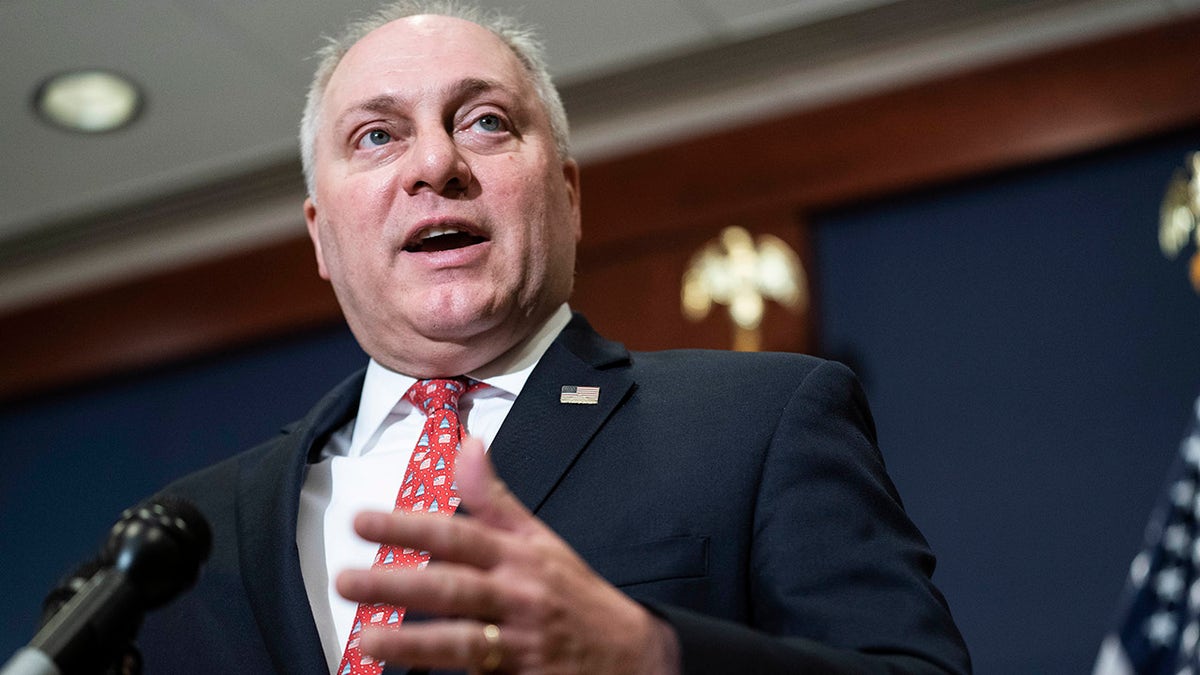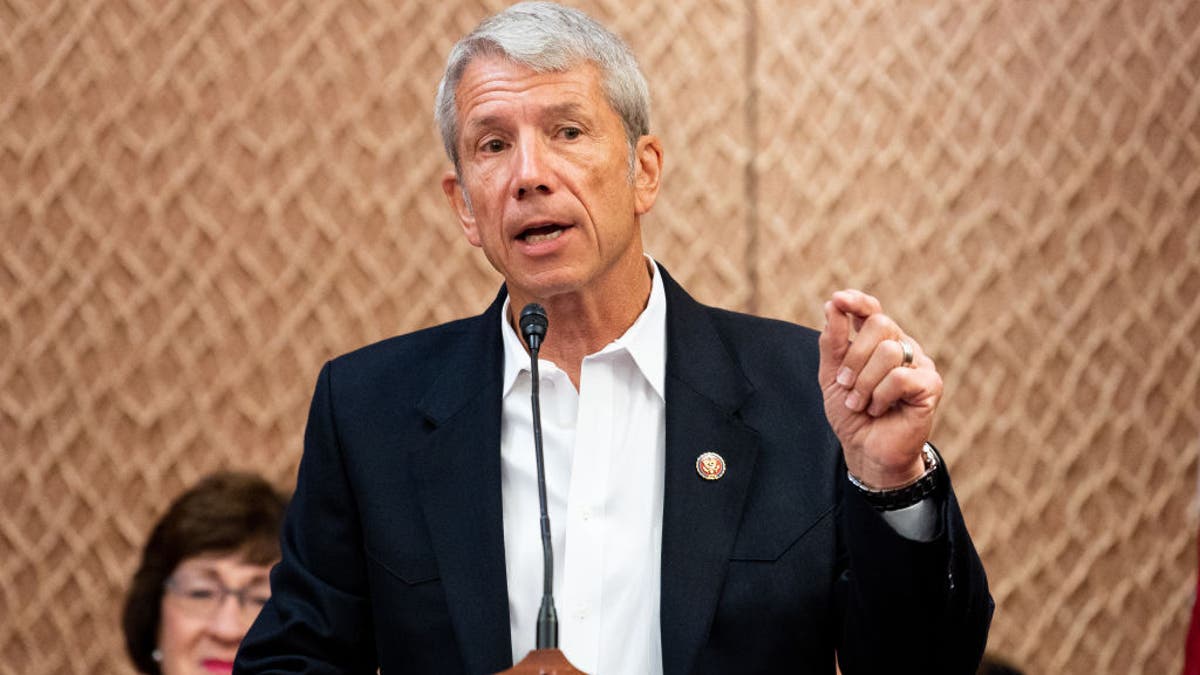Manchin touts 'red, white and blue' reconciliation deal despite recession woes: 'Tremendous opportunity'
Sen. Joe Manchin, D-W.V., joined 'Fox News Sunday' to discuss the legislation amid concerns surrounding rampant inflation and economic recession.
House Republicans and various advocacy groups are working to kill the $739 billion tax, climate change and health care bill authored by Sen. Joe Manchin, D-W.Va., and Senate Majority Leader Chuck Schumer, D-N.Y.
GOP leaders are whipping against the bill ahead of an expected House vote on Friday. Republicans are eager to show unified opposition to the legislation and make House Speaker Nancy Pelosi's slim Democratic majority solely responsible for its passage.
HOUSE REPUBLICANS PREP FIGHT AGAINST DEMS' SOCIAL SPENDING AND TAX BILL AS SENATE MOVES TO PASS
House Republican Whip Steve Scalise, R-La., told Fox News Digital the size and scale of the bill already made it untenable for most GOP lawmakers.
"Democrats’ reckless spending and job-killing policies have put our country into a recession and caused record-high inflation," said Scalise, the House GOP's chief vote counter. "Now they’re doubling down on their failed, radical agenda with this massive spending bill that raises taxes on Americans, hires an army of 87,000 IRS agents, and creates … slush funds for their leftist climate allies at the expense of taxpayers."

House Republican Whip Steve Scalise said the size and scale of the Manchin-Schumer bill made it untenable for most GOP lawmakers. (Sarah Silbiger/Getty Images)
The GOP whip added that House Republicans viewed the legislation as a massive "tax on Americans families" and were firmly in opposition.
Republicans know they cannot kill the legislation on their own. Rather they hope to make the vote more difficult by depriving Pelosi, D-Calif, of any help in passing the measure.
Pelosi currently can only lose four votes on any specific bill if the entire House is voting. The slim cushion means Pelosi needs almost every single vote for the Manchin-Schumer bill to succeed.
TRUMP PLEDGES TO CAMPAIGN AGAINST MANCHIN IN WEST VIRGINIA BECAUSE OF SPENDING BILL DEAL
That reality has mobilized outside groups with a vested interest in seeing the bill fail. The health care and pharmaceutical industries, in particular, are working hard to pressure moderate House Democrats into opposing the bill.
Industry groups say provisions within the Manchin-Schumer bill that cap insulin at $35 a month for the elderly and allow Medicare to negotiate the price of some life-saving prescription drugs amount to government price-fixing. They argue the legislation will drive up prices, while forcing drug companies to scale back research and investment in new pharmaceuticals.
"This drug pricing plan is based on a litany of false promises," said Stephen Ubl, the CEO of the Pharmaceutical Research and Manufacturers of America (PhRMA).
"They say they’re fighting inflation, but the Biden administration’s own data show that prescription medicines are not fueling inflation. They say this is ‘negotiation,’ but the bill gives the government unchecked authority to set the price of medicines. And they say the bill won’t harm innovation, but various experts, biotech investors and patient advocates agree that this bill will lead to fewer new cures and treatments for patients battling cancer, Alzheimer’s and other diseases," continued Ubl.

Industry groups say provisions within the Manchin-Schumer bill that cap insulin at $35 a month for the elderly and allow Medicare to negotiate the price of some life-saving prescription drugs amount to government price-fixing. (iStock)
Health care lobbyists are specifically targeting Democrats representing swing districts or moderates who are retiring or have lost their primary. The argument is largely focused on selling lawmakers that the bill will adversely impact seniors, a core voting block for both Democrats and Republicans.
"Health plans and drug makers are going to have to navigate more government in Medicare Part D, and they are concerned this will mean fewer benefits and care for our seniors," said a source familiar with the health care industry and its lobbying efforts. "Not to mention seniors will now be facing higher premiums during historic inflation."
The efforts appear not to be making much progress, however.
CLICK HERE TO GET THE FOX NEWS APP
A top target of health care lobbyists, moderate Democratic Rep. Kurt Schrader of Oregon, announced Monday he was committed to sending the bill swiftly to President Biden's desk. Schrader, who is retiring after losing a primary to a more progressive challenger, raised concerns about the prescription drug pricing plan while Democrats were debating an earlier iteration of the bill last year.
"The Inflation Reduction Act will reduce the deficit by hundreds of billions of dollars while lowering prescription drug costs for American families and strengthening health care," Schrader and other members of the moderate Congressional Blue Dog Coalition said in a joint statement. "The Blue Dog Coalition has long advocated for fiscally responsible policies, and this bill will place the nation on a sounder economic footing."

Rep. Kurt Schrader speaks at a press conference at the U.S. Capitol on June 27, 2019. (Michael Brochstein/SOPA Images/LightRocket via Getty Images)
House Democrats are expected to return from their month-long summer recess on Friday to pass the legislation. The Senate forced the measure through the 50-50 chamber along party lines over the weekend.
The legislation raises taxes by more than $700 billion, while spending more than $400 billion on climate change and health care initiatives.






